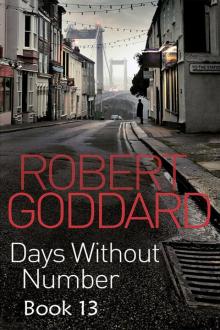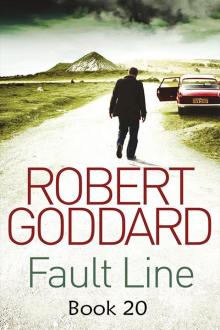- Home
- Robert Goddard
In Pale Battalions - Retail
In Pale Battalions - Retail Read online
About the Book
Six months after the sudden death of her husband, Leonora Galloway sets out on a trip to France with her daughter Penelope. At last the time has come when secrets can be shared and explanations begin …
Leonora takes her daughter to the battlefields of the First World War, where her father is commemorated on the Thiepval Monument. But the date of his death is surprising, and reveals that Captain John Hallows cannot possibly have been Leonora’s real father.
This is only the start of a series of revelations that span three generations of a distinguished aristocratic family who are not what they seem. Penelope must piece together a tale of war, of loss, of greed, deception and vice – and the perpetrator of a murder left unsolved for more than half a century …
Contents
Cover
About the Book
Title Page
In Memoriam
Acknowledgements
Epigraph
Prologue
Part One
Chapter One
Chapter Two
Chapter Three
Chapter Four
Part Two
Chapter One
Chapter Two
Chapter Three
Chapter Four
Chapter Five
Chapter Six
Chapter Seven
Chapter Eight
Chapter Nine
Chapter Ten
Part Three
Chapter One
Chapter Two
Chapter Three
Chapter Four
Chapter Five
Chapter Six
Epilogue
About the Author
Also by Robert Goddard
Copyright
IN PALE
BATTALIONS
ROBERT GODDARD
IN MEMORIAM
Frederick John Goddard, First Battalion, the Hampshire Regiment
Born Kimpton, Hampshire, 18th August 1885
Missing, presumed killed in action, Ypres, Belgium, 27th April 1915
HIS NAME LIVETH FOR EVERMORE
ACKNOWLEDGEMENTS
The lines quoted at the beginning and end of the book are the opening and closing lines of a sonnet by Charles Hamilton Sorley (1895–1915).
The lines from the poem ‘Not Waving but Drowning’ by Stevie Smith (1902–71), quoted here, are reproduced by kind permission of James MacGibbon.
When you see millions of the mouthless dead
Across your dreams in pale battalions go,
Say not soft things as other men have said,
That you’ll remember. For you need not so.
PROLOGUE
This is the day and this the place where a dream turns a corner and a secret is told. This is Thiepval, where only the clamping mist of an autumn morning can hide the massive, brick-arched statement of our collective conscience that is the Memorial to the Missing of the Somme. And this is where Leonora Galloway has brought her devoted daughter to begin her explanation of what has taken her most of a long life to understand.
To Monsieur Lefebvre, taxi-driver of Amiens, it is merely another fare, though more remunerative than most. A mother and daughter, elegantly dressed, breaking the rail journey from Calais to Paris, and requesting, in hesitant English-accented French, that he drive them the twenty-eight kilometres north-east along the flat, straight road to Albert, then up into the rolling hills above the Ancre valley to ‘le Mémorial Britannique de Thiepval’. He was scarcely likely to refuse, though to him such reminders of a long-ago conflict hold no appeal. Monsieur Lefebvre is himself possessed of a total and unaffected oblivion to the past and is comfortable in that condition. He has driven obediently to the place – the mist not at all restraining his speed – and sits now in his taxi, smoking a cigarette and watching the waiting-time tick up on his meter, flicking ash towards the sycamore trees fringing the car park and wondering idly how long his customers will decide to spend in this literally God-forsaken spot.
They left him some time ago and walked up the gravelled approach to the Memorial, still hidden at that stage by mist and screening fir trees. At length, it loomed through its seldom-worn shroud: huge, disproportionate, vaguely alien in the silent, cold-dewed modesty of the surrounding countryside. The two visitors spread anoraks on the long, curved stone bench that faces the Memorial and sit now, watching it slowly emerge into view as the mist begins to give way to the sun that burns above.
Leonora Galloway is a lady of seventy, tall, finely boned and well bred, grey-haired and slightly gaunt in a way that suggests youthful good looks: her graceful bearing owes more to taste and training than to delicacy of manner. Her daughter, Penelope, some thirty-five years her junior, appears, as they sit together, quite obviously her child: the same height, the same open, high-cheeked face, flaxen hair that flows to her shoulders but will one day be as grey and trimmed as her mother’s. Not as determined, perhaps, not as vigorous, but, if anything, more patient, more gentle, perhaps even more reliable. Part of Penelope’s charm lies in her early assumption of elderly virtues, part of Leonora’s in her resistance of them.
Earlier in the year, Leonora’s husband died suddenly at their cottage home in Somerset. She bore the blow with the fortitude expected of her. Now, six months later, she has set off for a holiday in Paris designed to aid her adjustment to the solitary life. Of her two children, Penelope was the obvious choice to accompany her, being long accustomed to such a life and possessing, unlike her married, more prosperous brother, one quality immediately endearing to Leonora: the capacity to think.
From Penelope’s point of view, there was also much to be said for the venture. Through thirty years of reliable memories, her mother has somehow contrived to evade her definition, her manner always brittly restrained, her accounts of herself cautiously vague. Penelope has been left with an abiding curiosity about the strangely distant, private woman who is her mother – a curiosity which, her daughter’s instincts have told her, this trip may at last satisfy. Already, her expectancy has been encouraged. The break of journey in Amiens was unscheduled, the taxi drive to Thiepval unexpected. Here, she feels certain, the explanations will begin.
‘I expect you’re wondering why we’ve come here,’ Leonora remarks, her words breaking in on her daughter’s thoughts.
‘Of course I am. But I’m sure you’ll tell me when you’re ready.’ It is something she remembers her father telling her long ago, a piece of good advice from a patient, self-effacing man: ‘Your mother will confide in you when she wants to, not when you want her to.’
The mist is thinner now, the brick-wrought statement of official mourning clearer as its backdrop shifts imperceptibly from muffled grey to verdant green and hazy blue. The two onlookers are dwarfed by the emergent edifice, a little shocked by its massive, graceless presence, huge and finely sculpted as it is.
‘The sun will be out soon,’ Leonora says. ‘Shall we go and look for his name?’
‘Whose name?’
‘My father’s. That’s why we’ve come here, you see.’
She rises from the bench, crosses the gravel drive and sets off across the wide lawn fronting the Memorial, her feet leaving dark prints behind her in the saturated grass. Penelope follows, patient as ever. To her the Somme means one battle, larger than most, amongst the mindless many of the First World War. She knows – because she has read of it – that thousands died there, her grandfather among them. Now, as she approaches the Memorial, she sees the huge brick pillars supporting its central archway are faced in stone and that the stone is minutely etched with names. At last its vastness is in part explained, for the names are the thousands of the missing of the Somme. Penelope stares up at them
, still ranked and filed for war, lists reaching higher than her eye can follow. She is taken aback. She has read of it, of course, but nobody has told her, nobody has prepared her for 73,412 men without a grave.
Leonora has gone ahead of her across the flagstoned plinth beneath the pillars, scanning the walls quickly, looking for the one she seeks. At the foot of one stone-wreathed column of names, she halts. There Penelope catches her up and follows with her eyes the direction of her gaze. Near the top of the pillar, the names of the Hampshire Light Infantry are assembled in order of rank. At the head, Captains Arnell, Bailey, Bland, Cade, Carrington, Cromie … and Hallows, Leonora’s maiden name. So there he is. Suddenly, to Penelope, it seems a long way to have come just for this.
‘Why didn’t you come before, Mother? There must have been visits arranged for relatives. We could all have come together.’
‘I hardly think so.’
‘Why on earth not?’
‘Because of what we’d have found here.’
‘What do you mean?’
‘Come and see.’
The two women move back towards the steps by which they ascended to the Memorial. At the base of each of the two gigantic pillars flanking the steps is a metal door let into the wall. Leonora opens the one to the left. Within are stacked several dog-eared but faithfully preserved volumes constituting the Memorial register. She leafs through one until she finds the place she wants, then holds it up for Penelope to see.
‘HALLOWS. Captain the Hon. John, son of Edward, Lord Powerstock, of Meongate, Droxford, Hampshire. Missing, presumed killed in action, Mametz, 30th April 1916, aged 29 years.’
The family’s sundered connection with the aristocracy is not new to Penelope. The Powerstock title ended, she knows, with this death on the Somme. Leonora’s mother died when she was only a few days old, leaving her to be brought up by her grandparents. After their death, the Meongate estate was dismantled. Neither money nor title ever found its way to Leonora, nor reminiscence of an aristocratic childhood, through her, to Penelope.
‘What’s wrong with this?’ she says, after staring blankly at the entry.
‘Come on, Penny. My father was killed on 30th April 1916, but I wasn’t born until 14th March 1917. Don’t you see now?’
‘Ah.’ Penelope smiles. ‘So that’s it. Well, this sort of thing was common enough in wartime, wasn’t it?’
‘Oh yes. Common enough, I dare say.’ Leonora replaces the book and pushes the door shut. ‘But not quite the point. I’ve always known my father wasn’t … well, wasn’t my father. Lady Powerstock made sure I knew and she made sure Tony knew as well.’
‘Then … where’s the harm?’
‘There wouldn’t be any, if it were as simple as that.’
Leonora turns and walks back through the archway, past the pillar bearing her father’s name and on to the steps at the rear of the Memorial. These lead down to a cemetery of unknown soldiers. To the left, French, marked with crosses, to the right, British, marked with plain stones. The stone appears white and painfully bright in the ever strengthening sunlight. Beyond the fir trees that bound the cemetery on three sides, the valleys of the Ancre and the Somme rivers roll away in restful curves where once such bitter struggles were fought and so many men were killed. The two women stand at the top of the steps and look down at the orderly scene.
It is Penelope who breaks the silence. ‘I realize I can’t imagine what it’s like to remember nothing of one’s parents, but I would like to try. You’ve never given me that chance, you know, never talked about your own childhood at all, even when pressed.’
‘I wanted you and Ronald to have the stability and security I lacked. I certainly didn’t want my childhood to cast a shadow over yours. By telling you nothing about it, I suppose I could pretend it never really happened.’
‘Was it really so bad? Knowing you were illegitimate, I mean.’
‘Illegitimacy is a small matter in this, Penny. Nowadays, smaller than ever. Lady Powerstock did her best to torment me with it, of course, but she had a far more effective hold over me than that.’
They begin to retrace their steps. Instinctively, Penelope knows better than to urge her mother on. She has herself no memory of Lady Powerstock and whenever Leonora has spoken of her – which has not been often – it has been with this same guarded bitterness. Now, however, it seems she is willing to say more. Sure enough, when they are clear of the Memorial, she resumes.
‘I’ve wanted to come to this place for more than fifty years, ever since my grandfather told me it existed and that my father was commemorated here.’
‘What stopped you? Finding out he wasn’t really your father after all?’
Leonora smiles. ‘You could say that was the reason.’
‘You don’t have to tell me if you don’t want to, you know, but did you ever find out who your real father was?’
‘Oh yes. I found out.’
The two women turn on to the gravel drive, their feet crunching on its surface, and move slowly away from the Memorial, back towards the entrance. This time, Penelope cannot restrain herself.
‘Who was he then, my grandfather?’
‘That, in part, is what I planned to tell you on this holiday. But I should warn you: it’s a long story.’
‘Don’t worry. I’ve waited a long time to hear it.’
‘And it’s as much about me as my father.’
‘I’ve waited a long time to hear that as well.’
They reach the taxi and climb into the rear seat. Monsieur Lefebvre starts back towards Amiens. He does not enquire if they have enjoyed their visit, nor does he trouble to listen to the older of his two passengers as she begins talking in her flat, suppressed, English voice.
‘We’ve never had much time to spend with each other, have we, Penny, you and I? I sometimes worry that I haven’t been the mother a good daughter deserves.’
‘I never wanted for anything.’
‘Except the warmth that comes from knowing me for what I really am. Tony’s death was a shock, of course, but it was something else as well: it was the end of a long pretence, a pretence that my life before marrying him did not exist. I persuaded myself that you and Ronald would be happier not knowing all there was to know about me – and in Ronald’s case I’m sure that’s true. But actually, of course, I was the one who wanted to forget. Now, I think, it’s time to remember.’
Half an hour later, as Monsieur Lefebvre slows in traffic on the outskirts of Amiens, Leonora has not finished. He is dimly aware that she is still talking and that his other passenger has said nothing since they left Thiepval, but he pays her words as much heed as he does the wide and lazy river Somme where it passes beneath the road bridge. He speeds on, immune to the past, whilst Penelope, who is not, continues to listen. For Leonora has not finished. In truth, she has only just begun.
PART ONE
ONE
CHILDHOOD MEMORIES FIT their own, intricate pattern. They cannot be made to conform to the version of our past we try to impose upon them. Thus I could say that Lord and Lady Powerstock and the home they gave me at Meongate more than compensated for being an orphan, that a silver spoon easily took the place of my mother’s smile. I could say it – but every recollection of my early years would deny it.
Meongate must once have been the crowded, bustling house of a cheerful family, as the Hallowses must once have been that family. Every favour of nature in its setting where the Hampshire downs met the pastures of the Meon valley, every effort of man in its spacious rooms and landscaped park, had been bestowed on the home of one small child.
Yet it was not enough. When I was growing up at Meongate in the early 1920s, most of its grandeur had long since departed. Many of the rooms were shut up and disused, much of the park turned over to farmland. And all the laughing, happy people I imagined filling its empty rooms and treading its neglected lawns had vanished into a past beyond my reach.
I grew up with the knowledge that my parents were both
dead, my father killed on the Somme, my mother carried off by pneumonia a few days after my birth. It was not kept from me. Indeed, I was constantly reminded of it, constantly confronted with the implication that I must in some way bear the blame for the shadow of grief, or of something worse, that hung over their memory. That shadow, cast by the unknown, lay at the heart of the cold, dark certainty that also grew within me: I was not wanted at Meongate, not welcomed there, not loved.
It might have been different had my grandfather not been the grave, withdrawn, perpetually melancholic man that he was. I, who never knew him when he was young, cannot imagine him as anything other than the wheelchair-bound occupant of his ground-floor rooms, deprived by his own morbidity, as much as by the lingering effects of a stroke, of all warmth and fondness. When Nanny Hiles took me, as she regularly did, to kiss him goodnight, all I wanted to do was escape from the cold, fleeting touch of his flesh. When, playing on the lawn, I would look up and see him watching me from his window, all I wanted to do was run away from the mournful, questing sadness in his eyes. Later, I came to sense that he was waiting, waiting for me to be old enough to understand him, waiting in the hope that he would live to see that day.
Lady Powerstock, twenty years his junior, was not my real grandmother. She was buried in the village churchyard, another ghost whom I did not know and who could do nothing to help me. I imagined her as everything her successor was not – kind, loving and generous – but it did me no good. Olivia, the woman I was required to address as Grandmama in her place, had once been beautiful and, at fifty, her looks were still with her, her figure still fine, her dress sense impeccable. That we were not related by blood explained, to my satisfaction, why she did not love me. What I could not explain was why she went so far as to hate me, but hate me she undoubtedly did. She did not trouble to disguise the fact. She let it hover, menacing and unspoken, at the edge of all our exchanges, let it grow as an awareness between us, a secret confirmation that she too was only waiting, waiting for death to remove her husband and with him any lingering restraint on her conduct towards me. There was an air of practised vice about her that was to draw men all her life, an air of voluptuous pleasure at her own depravity that made her hatred of me seem merely instinctive. Yet there was always more to it than that. She had drawn some venom from whatever part she had played in the past of that house and had reserved it for me.

 The Fine Art of Invisible Detection
The Fine Art of Invisible Detection One False Move
One False Move Panic Room
Panic Room Beyond Recall
Beyond Recall Out of the Sun
Out of the Sun In Pale Battalions - Retail
In Pale Battalions - Retail Painting The Darkness - Retail
Painting The Darkness - Retail The Corners of the Globe
The Corners of the Globe Name To a Face
Name To a Face Closed Circle
Closed Circle Caught In the Light
Caught In the Light Into the Blue
Into the Blue Past Caring - Retail
Past Caring - Retail Past Caring
Past Caring Hand In Glove - Retail
Hand In Glove - Retail Borrowed Time
Borrowed Time Days Without Number
Days Without Number James Maxted 03 The Ends of the Earth
James Maxted 03 The Ends of the Earth Fault Line - Retail
Fault Line - Retail Play to the End
Play to the End Sea Change
Sea Change Never Go Back
Never Go Back Take No Farewell - Retail
Take No Farewell - Retail Blood Count
Blood Count Found Wanting
Found Wanting Sight Unseen
Sight Unseen Hand in Glove
Hand in Glove The Ways of the World
The Ways of the World